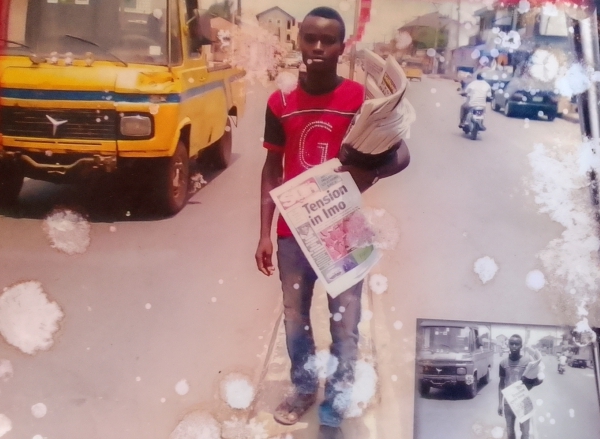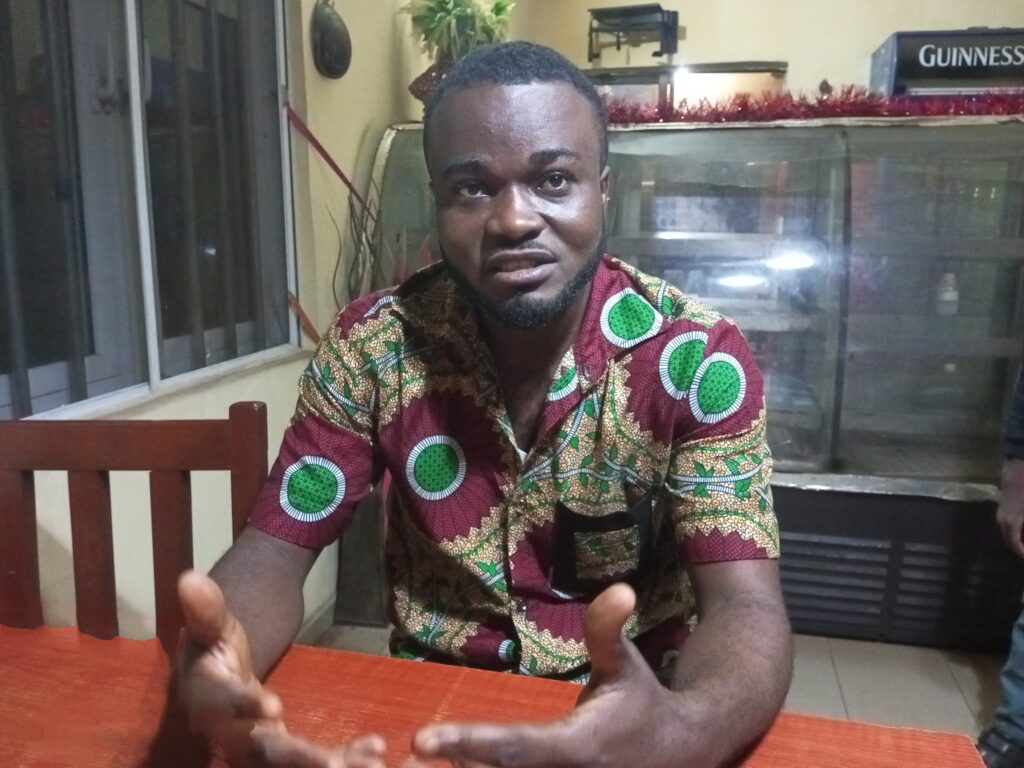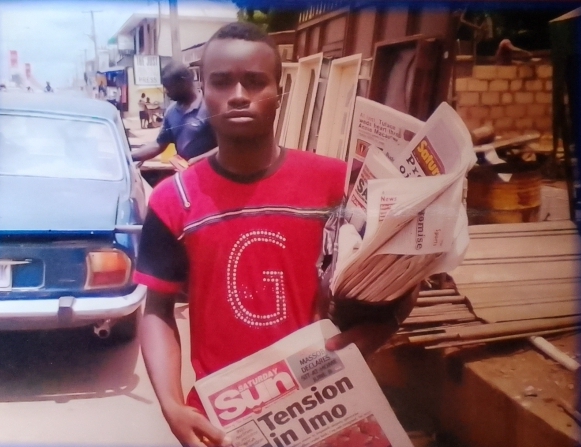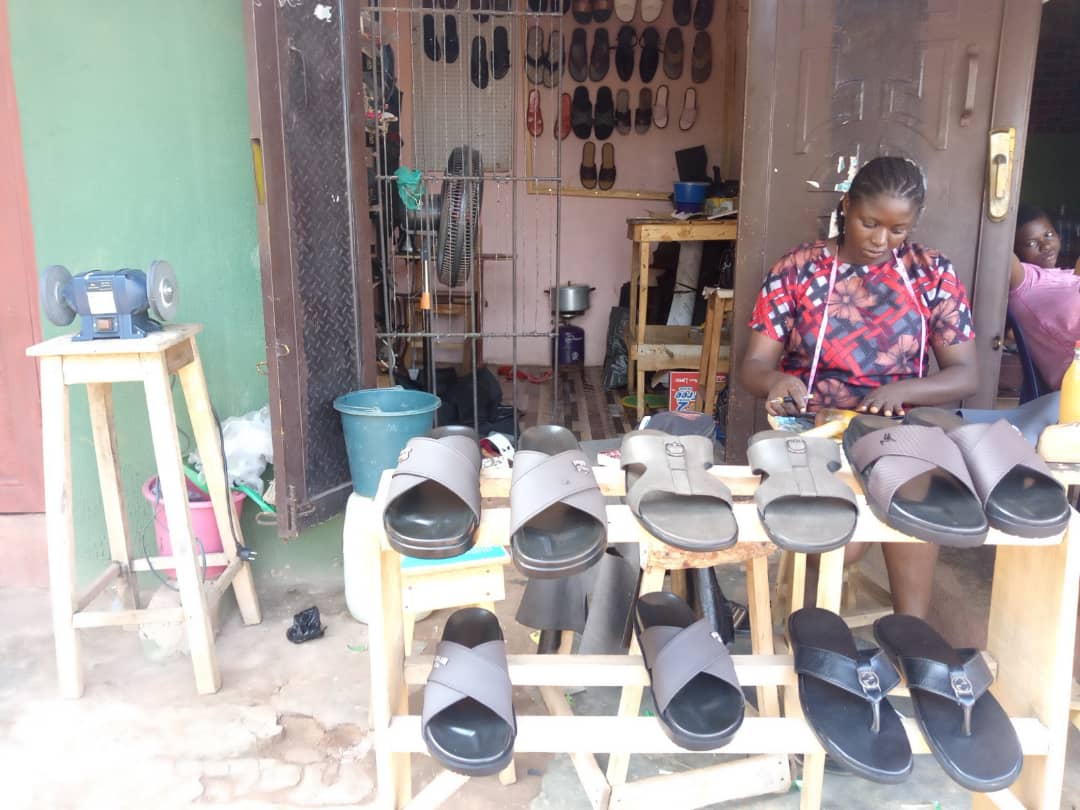Lawrence Nwimo, now a practicing journalist in Anambra State, began his journey on the streets—not with a pen, but with a stack of newspapers. Raised in a humble family background, his 12-year experience as a newspaper vendor shaped a story of grit, ambition, and remarkable transformation. In this exclusive interview with CoreTruth, the Master’s degree student opens up about his early struggles, the lessons from the streets, and how he navigated his way into the world of journalism.
Core Truth: What’s growing up like that compelled you to work for someone else at that early stage of life?
Nwimo: I came from a poor, humble background. I wasn’t born with silver spoon. My dad (late now) was a motorcycle mechanic. We are seven in the family, four girls and three boys, but I’m the first son. After my primary education, two persons came to my house, requesting for someone to assist them in their business – one of who was my Madam. I chose her against the other man because she promised to train me in school.
Though she was not specific of the type of assistance I’ll render to her, but as a lover of education I had no option than to accept the offer. From my early days, I was determined to succeed knowing my background.
Nicknamed “small boy”
I could remember the nickname they gave me then – “small boy” because of my age and size. I was faced with the risk of crossing the highway in pursuit of customers with other older colleagues. There was a day a speeding private vehicle from Onitsha nearly ran me over. But customers used to patronize me because of my size.
One miracle I won’t forget in a hurry was how God saved me from a fatal accident in 2008, at Kwata junction, that left about 80 persons dead. I was supposed to be around that spot when the incident happened but I went to Amawbia to sell papers that day. I was there when I got the news of the crash. That was how I relocated and remained in Amawbia for some years.
Core Truth: What informed your decision to quit newspaper vending for journalism?
Nwimo: My becoming a journalist was more of passion. I started journalism practice as an undergraduate not knowing that I’ll eventually become a full-fledged journalist. I studied Library and Information Technology at Federal College of Education (Technical) Umunze, affiliated with Nnamdi Azikiwe University, Awka.

While in year one, I had a conversation with a friend who asked me what I intended doing after graduation. He asked – “Don’t you think this course would not offer you much after all?” I laughed it off then. But on getting home, I gave that question a deeper thought and reasoned within myself of a need to have a plan B in case I later found it difficult to secure job on graduation.
I asked myself what else I have passion for and I know that is writing. While in secondary school, I had a long note dedicated for writing essays and articles. I decided to develop my writing skills.
unusual coping instinct
Meanwhile, I was combining my studies with selling newspapers because I lived with a woman popular called Madam Kon, who was into newspaper sales/circulation. Actually, she trained me from secondary to tertiary level. During my university days, I was shuttling between Awka and Umunze because she insisted that I must come to Awka every weekend for street newspaper hawking.
Since I’m always in possession of newspapers, I developed interest in reading each of them. One day, while flipping through the pages of one of them, I came across an advert seeking for reporters in one of the media outfits in the state. I quickly wrote an application and took it to a friend who happens to be in the line of communication.
I told him of my interest and he asked if I’m sure it’s something I could do. He also expressed fears of the difficulty I’ll face in sourcing for materials. After convincing him of my capabilities, he promised to link me up with his boss, one Emeka Odogwu to coach me further. I quickly contacted Odogwu who booked an appointment with me.
One of the things I remembered he told me was that there’s no money in journalism. I replied him that my interest was not the money but in learning the job. That same day he gave me assignment to write a feature story on a market in my locality. Before then, I’ve not written any news story, not to talk of features. I took it up as a challenge. It took me up to one month to knock out the features titled, “Umunze market, a disaster waiting to happen”.
From then, Odogwu started sending me on assignments and of course, I kept making mistakes until I stabilized. I also covered inaugural lectures and other campus activities. The more I reported those events the more the interest developed. At a point, I was seen as a celebrity in the institution. That was how I gradually mastered the art.
Vending after primary education
Core Truth: When exactly did you start newspaper vending and how long did you sell it?
Nwimo: That was 2006 after my primary school. I started from Kwata junction along the Enugu-Onitsha expressway. That was before the flyover was constructed. I sold the paper up till my final year. I stopped selling papers the exact day I wrote my last paper in 2018.
Core Truth: Selling newspapers, especially as an undergraduate can be challenging if not frustrating. How did you cope with the insults, shame and humiliation such menial jobs could bring?
Nwimo: Actually, that was a very big challenge. When I gained admission in 2014, my madam promised to train me, but on a condition of continued selling newspapers, but this time with a weekly stipend of N3,000. She warned that any default would attract withdrawal. For the 4 years I spent in school, nobody knew I was a newspaper vendor, except few individuals. I kept dodging anytime I see my classmates. I felt they would use it against me if they find out.
Dual identity
Nwimo: That made me to live dual lives. In school, I faced my studies squarely; but at work, my eyes were as sharp as eagle’s. My securing admission made me change from street hawking to selling at a spot, at least to reduce the number of persons that will see me each day. Though the few persons (including my HOD) that saw me were proud of me, but I didn’t understand it that way. My solace was that I won’t sell papers for eternity. That was why at graduation, I went to my madam and told her I was done.
Core Truth: How profitable was vending business and what did you do with the proceeds?
Nwimo: Yes, the business was lucrative then. That was close to the emergence of internet. But as years passed by, sales and profits started dropping. When I started, a copy of newspaper was sold for N80 and if you sell a copy, you’re entitled to N20. A vendor could finish 50 copies of SUN, for example before noon. As the prices increased, so the profit. Though I was entitled to the profit, but I retire all to my madam who is responsible for my feeding and upkeep.
Once lucrative
Newspaper business was so lucrative that many built houses and bought cars with the proceeds. But the trend started changing around 2014-16. I had also expected my madam to reduce my days of business and probably my stipend in view of drop in sales. But she insisted on the sale. Even while in school. There was no weekend I missed sales. I sold full time during holidays.
Core Truth: How did you combine newspaper vending with your academics?
Nwimo: It was really a miracle because if you check my academic records, you won’t believe it was from someone with such distractions. In-fact, I was among the best 3 graduating students in my department. After Friday lectures, I would always leave for Awka to only return to Umunze Sunday night in preparation for Monday lectures. I’m the kind of students that loved studying ahead. I would collect materials from my predecessors, at least three of them which I devoted time to study every holiday. Before resumption of a new semester, I was already good to go.
Core Truth: You said you took advantage of your access to newspapers to read them. Did that contribute in shaping your journalistic writing skills?
Nwimo: Yes. It did not only contribute in shaping my writing skills but venturing into journalism practice. Right from time, I love reading. I remember reading articles of columnists like Funke Egbemode, Dimgba Igwe, Jude Atupulazi and other authors. I consumed every newspaper at my disposal, though that attitude pitched me against my madam. At times she would scold me for reading instead of giving 100 percent attention to selling the papers. But I didn’t bother.
Knowledgeable vendor
Most of our customers knew that I have knowledge of the content of most papers, they would come to me and ask, “which paper carry better news?” I would advise them on the ones to buy. Same was applicable to those looking for jobs. That gave me an edge over my colleagues whose interests were only in the number of papers they sold.
Core Truth: How many media houses have you worked for and how do you feel being a journalist?
Nwimo: As a campus reporter, I contributed to New Telegraph, Authority and Daily Sun. After graduation, I reported for “Ogene Newspaper,” a community newspaper. I also freelanced for Sun newspapers before being employed at Orient Daily Newspaper. I’m currently with Ikenga Online and Odogwu blog.

I feel great especially when I compare myself with my contemporaries who see me today as a big man. Journalism has taken me to places and I have enjoyed company of the high and mighty in the society. When I remember all the derogatory names and remarks they make about me then, I feel good. Some of the special recognitions I’ve gotten from the profession as well as personalities I’ve met also make me feel on top.
Best journalism story
Core Truth: Which of your stories would you rate as your best?
Nwimo: Well, that would be difficult to pick. Apart from my investigative stories, I rate highly one of the reports I did in Aba, titled: Obohia, “a health disaster waiting to happen.” It was my first time of visiting Aba with my sick dad during my NYSC, and I seized the opportunity to do that report.
I also cherish my report titled: Five Years After Disability Law, PWDS in Anambra Still Denied Inclusion.” It was published last year and it fetched me the first runner-up of the Prof. Stella Okunna Award for Ethical Journalism. They are countless that still give me joy today.
Core Truth: What’s your advice to youths of today who view these menial but lucrative jobs as not befitting for them?
Nwimo: When I talk to the youths, I make them to appreciate that life is all about what you decide to make of it. Life is all about determination. As you’re building, you’re adding knowledge and that makes you stronger. Tracing my life history, you’ll see determination and eagerness to succeed. One peculiar incident I wouldn’t forget hurriedly is a comment by someone to me while hawking newspaper. He said, “I like the way you’re suffering now so that when money start coming, you won’t waste it on women.”
That statement registered in my mind. Any time money comes in and the thought of squandering it comes, I’ll remember that comment. We were seven boys under my madam then but I am the only graduate. That tells me that life requires patience. When I see those hawking along the street, I remember my years of struggle. The youths must know that there’s no amount of struggle and suffering that will kill them. But they will rather be toughened by life challenges.
Core Truth: Any regrets in life?
Nwimo: I had intended being a military officer. I had wanted to join the Nigerian Defense Academy (NDA). But I wasn’t taken, not because of poor performance, but on quota basis. I scored over 250 in JAMB, but it was only 6 persons that were selected from my state. That was a very big disappointment because I wanted to study something different in the university. But instead of wasting extra year, I decided to go for the course I eventually studied. That’s the only thing I can see as regret in my life. But that doesn’t mean I don’t like the course because I see lots of prospects.




Very inspiring story
You can say that again. Another proof that resilience pays.
This is really inspiring. Kudos bro